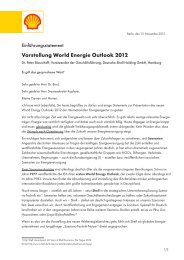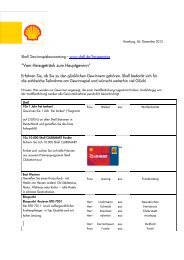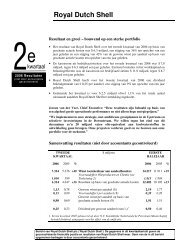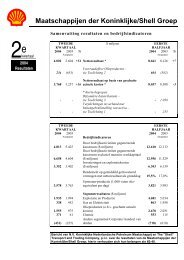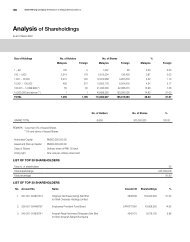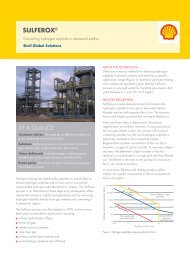Z7950 Statement of Gen Business
Z7950 Statement of Gen Business
Z7950 Statement of Gen Business
Create successful ePaper yourself
Turn your PDF publications into a flip-book with our unique Google optimized e-Paper software.
Royal Dutch/Shell Group <strong>of</strong> Companies<br />
<strong>Statement</strong> <strong>of</strong><br />
<strong>Gen</strong>eral <strong>Business</strong><br />
Principles
Introduction<br />
This document reaffirms the general business<br />
principles that govern how each <strong>of</strong> the Shell<br />
companies which make up the Royal Dutch/Shell<br />
Group <strong>of</strong> Companies conducts its affairs.<br />
The Group is a decentralised, diversified group <strong>of</strong><br />
companies with widespread activities, and each Shell<br />
company has wide freedom <strong>of</strong> action. However what<br />
we have in common is the Shell reputation.<br />
Upholding the Shell reputation is paramount. We are<br />
judged by how we act. Our reputation will be upheld<br />
if we act with honesty and integrity in all our<br />
dealings and we do what we think is right at all times<br />
within the legitimate role <strong>of</strong> business.<br />
Shell companies have as their core values honesty,<br />
integrity and respect for people. Shell companies also<br />
firmly believe in the fundamental importance <strong>of</strong> the<br />
promotion <strong>of</strong> trust, openness, teamwork and<br />
pr<strong>of</strong>essionalism, and in pride in what they do.<br />
Our underlying corporate values determine our<br />
principles. These principles apply to all transactions,<br />
large or small, and describe the behaviour expected<br />
<strong>of</strong> every employee in every Shell company in the<br />
conduct <strong>of</strong> its business.<br />
In turn, the application <strong>of</strong> these principles is<br />
underpinned by procedures within each Shell<br />
company which are designed to make sure that its<br />
employees understand the principles and that they<br />
act in accordance with them. We recognise that it is<br />
vital that our behaviour matches our intentions.<br />
All the elements <strong>of</strong> this structure – values, principles<br />
and the accompanying procedures – are necessary.
Shell companies recognise that maintaining the trust<br />
and confidence <strong>of</strong> shareholders, employees,<br />
customers and other people with whom they do<br />
business, as well as the communities in which they<br />
work, is crucial to the Group’s continued growth<br />
and success.<br />
We intend to merit this trust by conducting ourselves<br />
according to the standards set out in our principles.<br />
These principles have served Shell companies well for<br />
many years. It is the responsibility <strong>of</strong> management to<br />
ensure that all employees are aware <strong>of</strong> these<br />
principles, and behave in accordance with the spirit<br />
as well as the letter <strong>of</strong> this statement.<br />
C A J Herkstöter<br />
Chairman <strong>of</strong> the Committee<br />
<strong>of</strong> Managing Directors<br />
March 1997
1. Objectives<br />
The objectives <strong>of</strong> Shell companies are to engage<br />
efficiently, responsibly and pr<strong>of</strong>itably in the oil, gas,<br />
chemicals and other selected businesses and to<br />
participate in the search for and development <strong>of</strong><br />
other sources <strong>of</strong> energy. Shell companies seek a high<br />
standard <strong>of</strong> performance and aim to maintain a longterm<br />
position in their respective competitive<br />
environments.<br />
2. Responsibilities<br />
Shell companies recognise five areas <strong>of</strong> responsibility:<br />
a. To shareholders<br />
To protect shareholders’ investment, and provide an<br />
acceptable return.<br />
b. To customers<br />
To win and maintain customers by developing and<br />
providing products and services which <strong>of</strong>fer value in<br />
terms <strong>of</strong> price, quality, safety and environmental<br />
impact, which are supported by the requisite<br />
technological, environmental and commercial<br />
expertise.<br />
c. To employees<br />
To respect the human rights <strong>of</strong> their employees, to<br />
provide their employees with good and safe<br />
conditions <strong>of</strong> work, and good and competitive terms<br />
and conditions <strong>of</strong> service, to promote the<br />
development and best use <strong>of</strong> human talent and equal<br />
opportunity employment, and to encourage the<br />
involvement <strong>of</strong> employees in the planning and<br />
direction <strong>of</strong> their work, and in the application <strong>of</strong><br />
these principles within their company. It is<br />
recognised that commercial success depends on the<br />
full commitment <strong>of</strong> all employees.<br />
d. To those with whom they do business<br />
To seek mutually beneficial relationships with<br />
contractors, suppliers and in joint ventures and to<br />
promote the application <strong>of</strong> these principles in so<br />
doing. The ability to promote these principles
effectively will be an important factor in the decision<br />
to enter into or remain in such relationships.<br />
e. To society<br />
To conduct business as responsible corporate<br />
members <strong>of</strong> society, to observe the laws <strong>of</strong> the<br />
countries in which they operate, to express support<br />
for fundamental human rights in line with the<br />
legitimate role <strong>of</strong> business and to give proper regard<br />
to health, safety and the environment consistent with<br />
their commitment to contribute to sustainable<br />
development.<br />
These five areas <strong>of</strong> responsibility are seen as<br />
inseparable. Therefore it is the duty <strong>of</strong> management<br />
continuously to assess the priorities and discharge its<br />
responsibilities as best it can on the basis <strong>of</strong> that<br />
assessment.<br />
3. Economic Principles<br />
Pr<strong>of</strong>itability is essential to discharging these<br />
responsibilities and staying in business. It is a measure<br />
both <strong>of</strong> efficiency and <strong>of</strong> the value that customers<br />
place on Shell products and services. It is essential to<br />
the allocation <strong>of</strong> the necessary corporate resources<br />
and to support the continuing investment required to<br />
develop and produce future energy supplies to meet<br />
consumer needs. Without pr<strong>of</strong>its and a strong<br />
financial foundation it would not be possible to fulfil<br />
the responsibilities outlined above.<br />
Shell companies work in a wide variety <strong>of</strong> changing<br />
social, political and economic environments, but in<br />
general they believe that the interests <strong>of</strong> the<br />
community can be served most efficiently by a market<br />
economy.<br />
Criteria for investment decisions are not exclusively<br />
economic in nature but also take into account social<br />
and environmental considerations and an appraisal <strong>of</strong><br />
the security <strong>of</strong> the investment.
4. <strong>Business</strong> Integrity<br />
Shell companies insist on honesty, integrity and<br />
fairness in all aspects <strong>of</strong> their business and expect the<br />
same in their relationships with all those with whom<br />
they do business. The direct or indirect <strong>of</strong>fer,<br />
payment, soliciting and acceptance <strong>of</strong> bribes in any<br />
form are unacceptable practices. Employees must<br />
avoid conflicts <strong>of</strong> interest between their private<br />
financial activities and their part in the conduct <strong>of</strong><br />
company business. All business transactions on behalf<br />
<strong>of</strong> a Shell company must be reflected accurately and<br />
fairly in the accounts <strong>of</strong> the company in accordance<br />
with established procedures and be subject to audit.<br />
5. Political Activities<br />
a. Of companies<br />
Shell companies act in a socially responsible manner<br />
within the laws <strong>of</strong> the countries in which they operate<br />
in pursuit <strong>of</strong> their legitimate commercial objectives.<br />
Shell companies do not make payments to political<br />
parties, organisations or their representatives or take<br />
any part in party politics. However, when dealing<br />
with governments, Shell companies have the right and<br />
the responsibility to make their position known on<br />
any matter which affects themselves, their employees,<br />
their customers, or their shareholders. They also have<br />
the right to make their position known on matters<br />
affecting the community, where they have a<br />
contribution to make.<br />
b. Of employees<br />
Where individuals wish to engage in activities in the<br />
community, including standing for election to public<br />
<strong>of</strong>fice, they will be given the opportunity to do so<br />
where this is appropriate in the light <strong>of</strong> local<br />
circumstances.
6. Health, Safety and the Environment<br />
Consistent with their commitment to contribute to<br />
sustainable development, Shell companies have a<br />
systematic approach to health, safety and<br />
environmental management in order to achieve<br />
continuous performance improvement.<br />
To this end, Shell companies manage these matters as<br />
any other critical business activity, set targets for<br />
improvement, and measure, appraise and report<br />
performance.<br />
7. The Community<br />
The most important contribution that companies can<br />
make to the social and material progress <strong>of</strong> the<br />
countries in which they operate is in performing their<br />
basic activities as effectively as possible. In addition<br />
Shell companies take a constructive interest in<br />
societal matters which may not be directly related to<br />
the business. Opportunities for involvement – for<br />
example through community, educational or<br />
donations programmes – will vary depending upon<br />
the size <strong>of</strong> the company concerned, the nature <strong>of</strong> the<br />
local society, and the scope for useful private<br />
initiatives.<br />
8. Competition<br />
Shell companies support free enterprise. They seek to<br />
compete fairly and ethically and within the framework<br />
<strong>of</strong> applicable competition laws; they will not prevent<br />
others from competing freely with them.<br />
9. Communication<br />
Shell companies recognise that in view <strong>of</strong> the<br />
importance <strong>of</strong> the activities in which they are engaged<br />
and their impact on national economies and<br />
individuals, open communication is essential. To this<br />
end, Shell companies have comprehensive corporate<br />
information programmes and provide full relevant<br />
information about their activities to legitimately<br />
interested parties, subject to any overriding<br />
considerations <strong>of</strong> business confidentiality and cost.
© Shell international Limited 1997<br />
Permission to reproduce any part <strong>of</strong> this publication should<br />
be sought from Shell International Limited. Agreement will<br />
normally be given, provided that the source is acknowledged.<br />
Shell companies have their own identities. In this publication<br />
the collective expressions ‘Shell’ and ‘Group’ and ‘Royal<br />
Dutch/Shell Group <strong>of</strong> Companies’ may be used for convenience<br />
where the reference is made to companies <strong>of</strong> the Royal<br />
Dutch/Shell Group in general. Those expressions are also<br />
used where no useful purpose is served by identifying the<br />
particular company or companies.<br />
First published in 1976


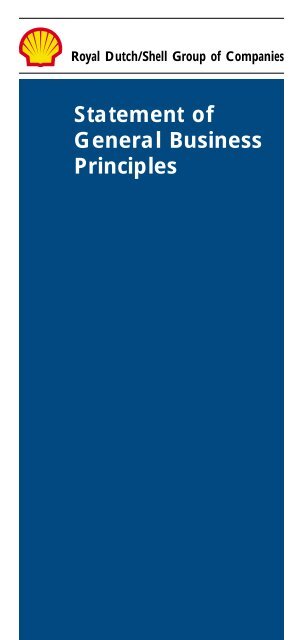

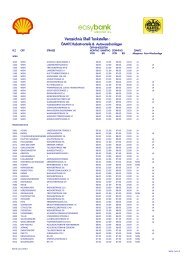
![Download Shell AutoGas Stationen [Stand: Januar 2013] (PDF](https://img.yumpu.com/9982753/1/190x245/download-shell-autogas-stationen-stand-januar-2013-pdf.jpg?quality=85)

